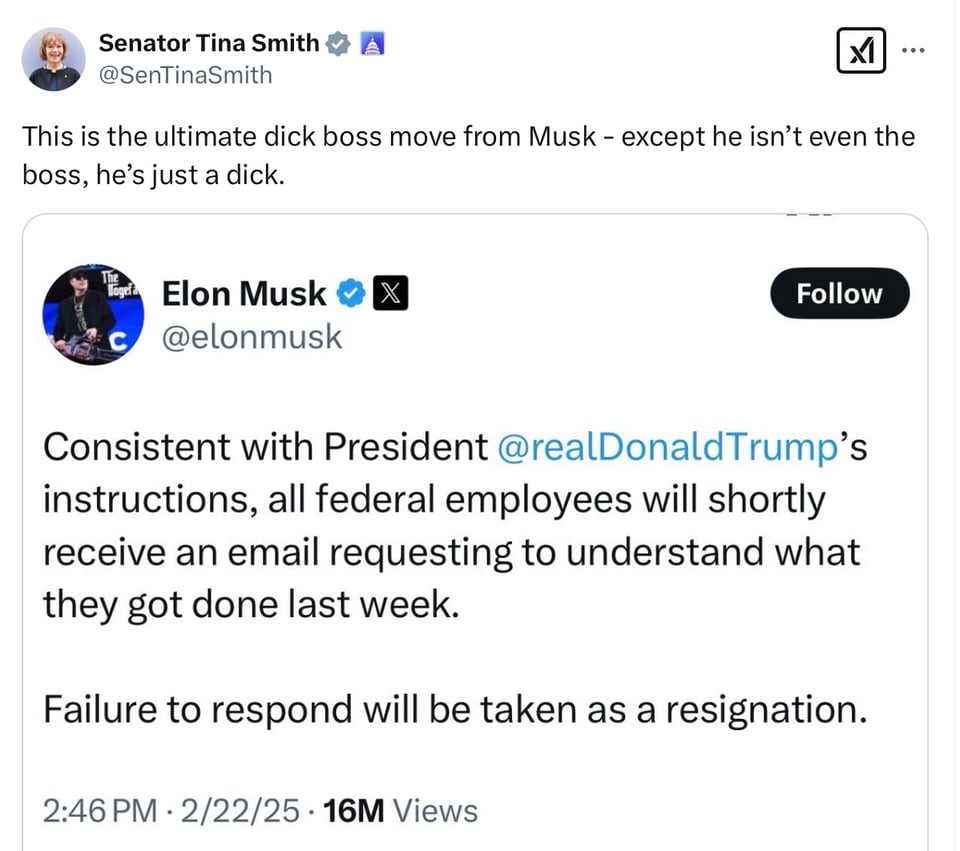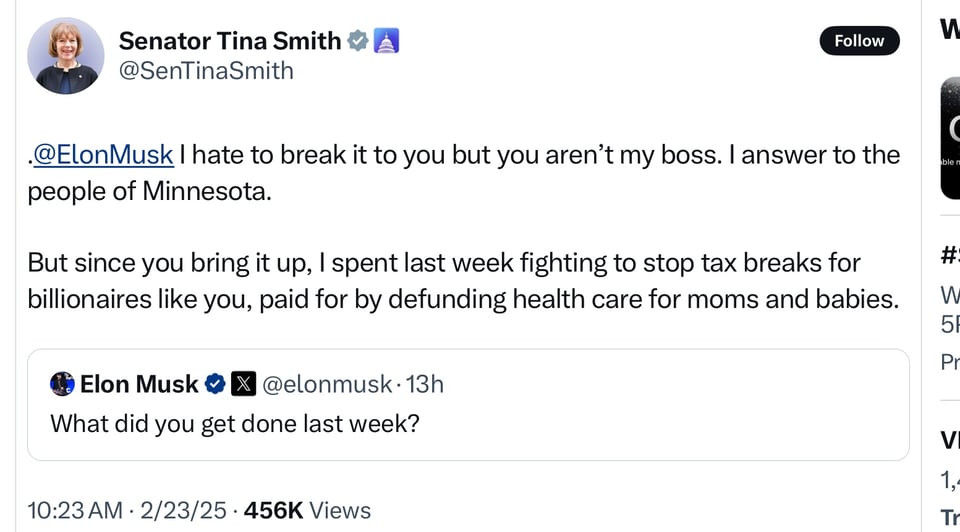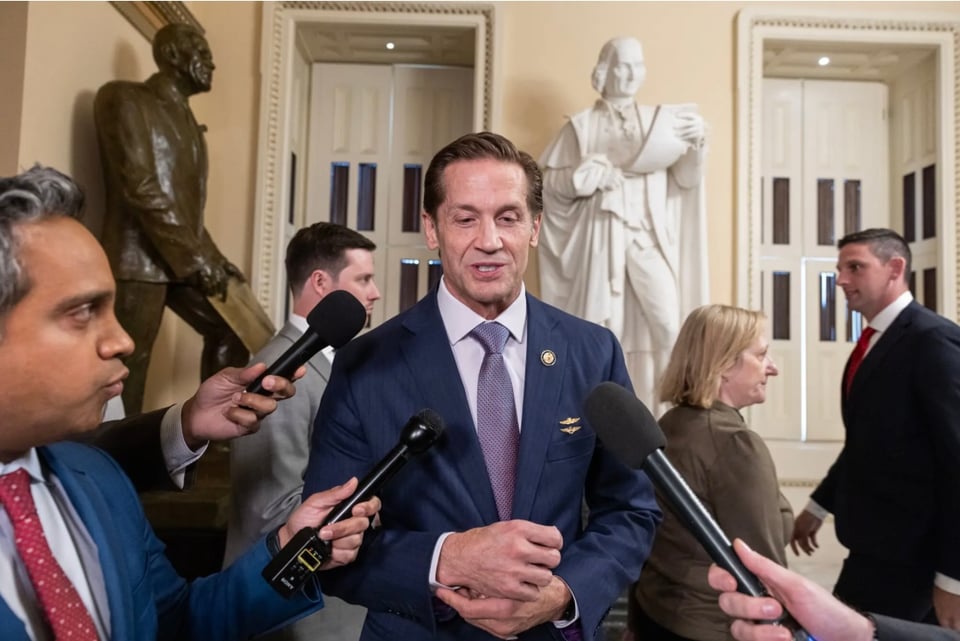Monday, February 24, 2025. Annette’s Roundup for Democracy.
Prevarication vs. Lying.

Tired of those who aren’t candid. I mean truthful.
First, good piece by the New York Times chief White House correspondent, Peter Baker.👇 But when you see the word “manipulations of the truth” and “penchant for prevarication” in an article condemning Trump for lying, you know Peter Baker is holding back when we need the truth to move forward.
In Trump’s Alternative Reality, Lies and Distortions Drive Change
Condoms for Gaza? Ukraine started the war with Russia? The president’s manipulations of the truth lay the groundwork for radical change.
The United States sent $50 million in condoms to Hamas. Diversity programs caused a plane crash. China controls the Panama Canal. Ukraine started the war with Russia.
Except, no. None of that is true. Not that it stops President Trump. In the first month since he returned to power, he has demonstrated once again a brazen willingness to advance distortions, conspiracy theories and outright lies to justify major policy decisions.
Mr. Trump has long been unfettered by truth when it comes to boasting about his record and tearing down his enemies. But what were dubbed “alternative facts” in his first term have quickly become a whole alternative reality in his second to lay the groundwork for radical change as he moves to aggressively reshape America and the world.
If the U.S. Agency for International Development is stupid enough to send prophylactics to a Palestinian terrorist group in Gaza, he claims, then it deserves to be dismantled. If recruiting people other than white men to work in the airline sector compromises safety, such programs should be eliminated. If China controls the strategic passage through the continent, the United States should take it back. If Ukraine is the aggressor, it should make concessions to Moscow.
One of the biggest presidential powers that Trump has deployed is the ability to shape his own narrative,” said Julian E. Zelizer, a Princeton history professor and editor of a book of essays about Mr. Trump’s first term. “We have seen repeatedly how President Trump creates his own reality to legitimate his actions and simultaneously discredit warnings about his decisions.”
Taking his real-estate hucksterism and reality-show storytelling into politics, Mr. Trump has for years succeeded in selling his version of events. The world according to Mr. Trump is one where he is a master of every challenge and any failure is someone else’s fault.
He claimed to have built the greatest economy in history during his first term so many times that even some of his critics came to accept that it was better than it really was. He dismissed intelligence reports that Russia intervened in the 2016 elections on his behalf so often that many supporters accepted his denial.
Most significantly, Mr. Trump has waged a four-year campaign to persuade Americans that he did not lose the 2020 election when in fact he did, making one false assertion of widespread fraud after another that would all be debunked yet still leave most Republicans convinced it was stolen, according to polls.
At the same time, he has recast the Jan. 6, 2021, assault on the Capitol by supporters trying to stop the transfer of power from a “heinous attack,” as he originally termed it, to a “day of love,” as he now calls it. This revised interpretation helped him rationalize pardoning nearly 1,600 people who were charged, including many who had beaten police officers.
“Trump is a highly skilled narrator and propagandist,” said Ruth Ben-Ghiat, author of “Strongmen: Mussolini to the Present” and a historian at New York University who specializes in fascism and authoritarianism. “Actually he is one of the most skilled propagandists in history.”
Dr. Ben-Ghiat said what made Mr. Trump’s “easily refutable lie” about the 2020 election so remarkable was that he was “working not in a one-party state or authoritarian context with a controlled media, but in a totally open society with a free press.”
But she and other scholars said some of Mr. Trump’s themes resemble those seen in authoritarian states. “The kind of propaganda and disinformation that we see now is not particularly new and not dependent on the internet,” said Benjamin Carter Hett, a historian of World War II at Hunter College. “Exactly the same kind of thing happened in the very diverse and lively German press of the 1920s and 1930s.”
Mr. Trump’s aides have long recognized his penchant for prevarication and either adjusted or eventually broke with him. John F. Kelly, his longest-serving White House chief of staff in his first term, has said that Mr. Trump would tell his press aides to publicly repeat something that he had just made up. When Mr. Kelly would object, saying, “but that’s not true,” Mr. Trump would say, “but it sounds good.”
Stephanie Grisham, who served as a White House press secretary in the first term, once recalled that Mr. Trump would tell aides that “as long as you keep repeating something, it doesn’t matter what you say.” And that trickled down to the staff. “Casual dishonesty filtered through the White House as though it were in the air-conditioning system,” she wrote in her memoir.
Anthony Scaramucci, a former Trump ally who served briefly as his White House communications director, said on Friday that Mr. Trump believes dishonesty works. Mr. Trump, he said, is at “50 years of distorting things and telling lies and he is at 50 years of getting away with it, so why wouldn’t he make the lies bigger and more impactful in this last stretch?”
The exaggerations and falsehoods serve a strategic purpose. While Mr. Trump won a clean victory in November, including in the popular vote, which he lost in 2016, he did not win a majority and his 1.5-percentage-point margin was one of the lowest since the 19th century. But he regularly says that he won a “landslide victory,” which serves not just to stroke his ego but to assert an expansive popular mandate for his agenda.
Mr. Trump, who repeatedly disparaged media fact-checking during last year’s campaign, does not back off after misleading statements and lies are exposed. Instead, he tends to double down, repeating them even after it’s been reported that they are not true.
After reporters determined that the $50 million for condoms story was untrue, Mr. Trump not only repeated it, he increased the supposed total to $100 million. Nor did he back down after falsely claiming that U.S.A.I.D. had provided grants to media organizations as “a ‘payoff’ for creating good stories about the Democrats,” even after learning the money was simply for subscriptions.
Likewise, Mr. Trump made his claim about diversity programs and air safety the day after the midair collision of a passenger jet and Army helicopter in Washington without an ounce of proof, nor did he ever follow up with any. And while a Hong Kong company operates two of five ports adjacent to the Panama Canal, he continues to say the passage is controlled by China when in fact Panama operates it.
And to support his effort to rescind the constitutional right to birthright citizenship, Mr. Trump keeps saying that the United States is “the only country in the world that does this,” even though it has been repeatedly reported that in fact more than 30 countries do.
“Opponents end up arguing about his narratives regardless of how grounded they are in fact,” said Dr. Zelizer. “This has put President Trump in a perpetual position of advantage since he decides the terms of debate rather than anyone seeking to stop him.”
In Mr. Trump’s facts-are-fungible world, conspiracy theories at times are given as much weight as tangible evidence and those who traffic in them are granted access that no other president would give. Just this past week, he talked about going to Fort Knox to see if the nation’s gold really is there, indulging a fringe suspicion that it is somehow missing.
Invited to accompany Defense Secretary Pete Hegseth to Europe was Jack Posobiec, a far-right influencer who promoted the lie that Democrats were running a pedophile ring out of a Washington pizza parlor, a lie that inspired an armed man to burst in and open fire to save the supposed victims. Mr. Posobiec ended up not going but later accompanied Treasury Secretary Scott Bessent to Ukraine.
Mr. Trump’s blame-the-victim revisionism over Ukraine in recent days has been among the most striking efforts to translate his alternative reality into policy. Over the course of several recent days, he said that Ukraine “started” the war with Russia in 2022 and called the country’s president, Volodymyr Zelensky, a “dictator without elections,” while absolving President Vladimir V. Putin of Russia, an actual dictator who had invaded his neighbor. He went even further on Friday, saying, “It’s not Russia’s fault.”
By undercutting public sympathy for Ukraine, Mr. Trump may make it easier for him to strike a peace agreement with Mr. Putin giving Russia much of what it wants even over any objections by Mr. Zelensky or European leaders. Since Mr. Zelensky is a dictator responsible for the war, this reasoning goes, he deserves less consideration.
One of Mr. Trump’s claims about Ukraine offers a case study in his mythmaking. He said that the United States has provided $350 billion in aid to Ukraine, three times as much as Europe, but that much of the money is “missing” and that Mr. Zelensky “admits that half of the money we sent him is missing.”
In fact, the United States has allocated about a third of what Mr. Trump claimed, even less than Europe, and none of it is known to be missing.
The dollar figures cited for U.S. aid to Ukraine can vary depending on how government officials present them, what time period they cover and whether they include humanitarian and economic assistance.
How did Mr. Trump arrive at his claim? The White House did not respond to a request for elaboration. But it appears that Mr. Trump was referring to a recent interview with Mr. Zelensky that the president or his staff either misunderstood or distorted.
In the interview, Mr. Zelensky was asked by The Associated Press about exaggerated numbers and he corrected them. “When it’s said that Ukraine received $200 billion to support the army during the war, that’s not true,” Mr. Zelensky said according to a translation by Ukrainska Pravda, a Ukrainian news outlet. “I don’t know where all that money went.”
Mr. Zelensky was not saying that there was $200 billion and that he did not know where all of it went. He was saying there never was $200 billion in the first place. Even Mr. Trump’s special envoy to Ukraine, Keith Kellogg, has indicated no concern over missing money, saying that “we have a pretty good accounting of where it’s going.” Indeed, the vast bulk of U.S. aid approved for Ukraine has been in the form of weapons, not cash.
But that does not comport with the official line at the White House. Once Mr. Trump makes an assertion, those who work for him — and want to keep working for him — are compelled to tailor their own versions of reality to match his. Even if it requires them to abandon previous understandings of the facts.
So there was Michael Waltz, the former Republican congressman from Florida now serving as Mr. Trump’s national security adviser, pressed last week to reconcile his past comments about who was responsible for the war in Ukraine with his boss’s current position.
A reporter read aloud from an opinion column that Mr. Waltz had written in 2023 stating that “Putin is to blame, certainly, like Al Qaeda was to blame for 9/11.” Mr. Waltz was asked if he still believed that or whether he now shared Mr. Trump’s assessment that Ukraine had started the war.
“Well,” Mr. Waltz said carefully, “it shouldn’t surprise you that I share the president’s assessment on all kinds of issues. What I wrote as a member of Congress was as a former member of Congress.”
And so, Mr. Waltz’s actual reality gave way to Mr. Trump’s alternative version.(New York Times)
One more thing.
In the article he wrote, Peter Baker held back, but the Times print edition didn’t. 👇 Finally.

The Times just didn’t have the guts to have the same headline on the digital edition.
But others are becoming bolder. For example, bless Tina Smith, the retiring Senator from Minnesota. No holding back from her. Are you shocked? An outspoken Senator.





—
Then, meet the opposite of Baker and Smith and all good and sane people.👇
Trump is always crazy. Or is he just a liar, using lies as a weapon to fool the people?

How about this TRUMP lie 👇 about Ukrainian leader Zelenskyy that former ambassador to Russia, Michael McFaul, sets straight.
The American people are also speaking the truth to Republican Congressmen who don’t want to hear them.

The New York Times reported the developing anti-Trump sentiment in the Town Halls this way.
Republicans Face Angry Voters at Town Halls, Hinting at Broader Backlash.
After a monthlong honeymoon for the G.O.P. at the start of President Trump’s term, lawmakers are confronting a groundswell of fear and disaffection in districts around the country.

Representative Pete Sessions fielded a barrage of frustration from constituents at a town-hall meeting in Trinity, Texas, on Saturday.
Some came with complaints about Elon Musk, President Trump’s billionaire ally who is carrying out an assault on the federal bureaucracy. Others demanded guarantees that Republicans in Congress would not raid the social safety net. Still others chided the G.O.P. to push back against Mr. Trump’s moves to trample the constitutional power of Congress.
When Representative Pete Sessions, Republican of Texas, arrived at a crowded community center on Saturday in the small rural town of Trinity in East Texas, he came prepared to deliver a routine update on the administration’s first month in office. Instead, he fielded a barrage of frustration and anger from constituents questioning Mr. Trump’s agenda and his tactics — and pressing Mr. Sessions and his colleagues on Capitol Hill to do something about it.
“The executive can only enforce laws passed by Congress; they cannot make laws,” said Debra Norris, a lawyer who lives in Huntsville, arguing that the mass layoffs and agency closures Mr. Musk has spearheaded were unconstitutional. “When are you going to wrest control back from the executive and stop hurting your constituents?”
Louis Smith, a veteran who lives in East Texas, told Mr. Sessions that he agreed with the effort to root out excessive spending, but he criticized the way it was being handled and presented to the public.
“I like what you’re saying, but you need to tell more people,” Mr. Smith said. “The guy in South Africa is not doing you any good — he’s hurting you more than he’s helping,” he added, referring to Mr. Musk and drawing nods and applause from many in the room.
In Trinity and in congressional districts around the country over the past week, Republican lawmakers returning home for their first congressional recess since Mr. Trump was sworn in faced similar confrontations with their constituents. In Georgia, Representative Rich McCormick struggled to respond as constituents shouted, jeered and booed at his response to questions about Mr. Musk’s access to government data.
In Wisconsin, Representative Scott Fitzgerald was asked to defend the administration’s budget proposals as voters demanded to know whether cuts to essential services were coming.
Many of the most vocal complaints came from participants who identified themselves as Democrats, but a number of questions pressing Mr. Sessions and others around the country came from Republican voters. During a telephone town hall with Representative Stephanie Bice in Oklahoma, a man who identified himself as a Republican and retired U.S. Army officer voiced frustration over potential cuts to veterans benefits.
“How can you tell me that DOGE with some college whiz kids from a computer terminal in Washington, D.C., without even getting into the field, after about a week or maybe two, have determined that it’s OK to cut veterans benefits?” the man asked.
Beyond town halls, some Democrats have organized a number of protests outside the offices of vulnerable Republicans. More than a hundred demonstrators rallied outside the New York district office of Representative Mike Lawler. Elected Democrats are also facing fury from within the ranks of their party. A group of voters held closed-door meetings with members from the office of Senator Chuck Schumer, Democrat of New York and the minority leader, after a demonstration at his New York offices.
Some of the scenes recalled the raucous town-hall meetings of 2009 that heralded the rise of the ultraconservative Tea Party, where throngs of voters showed up protesting President Barack Obama’s health care law and railed against government debt and taxes. It is not yet clear whether the current backlash will persist or reach the same intensity as it did back then. But the tenor of the sessions suggests that, after a brief honeymoon period for Mr. Trump and Republicans at the start of their governing trifecta, voters beginning to digest the effects of their agenda may be starting to sour on it.

Representative Rich McCormick, a Republican from Georgia, also faced shouts and jeers from constituents at a meeting last week.
Mr. Sessions, who was first elected to Congress nearly three decades ago and represents a solidly Republican district, appeared unfazed by the disruptions on Saturday. Some audience members laughed at him and retorted with hushed but audible expletives when he spoke about his support of some of Mr. Trump’s policy proposals and early actions.
And some of his constituents were plainly pleased by what they had seen so far from the new all-Republican team controlling the White House and both chambers of Congress. Several cheered an executive order barring transgender women and girls from participating in school athletic programs designated for female students, applauded plans to shrink the Department of Education and welcomed calls from Mr. Sessions to end remote work flexibility for federal employees.
“Ladies and gentlemen, we are going to have a reduction in force,” Mr. Sessions told the crowd.
And while many in the room voiced displeasure over the sweeping changes underway in Washington, some were agitating for bolder action to address what they called government corruption — not for pumping the brakes.
As Mr. Sessions spoke about the administration’s efforts to streamline bureaucracy and root out wasteful spending, shouts erupted.
“Take care of it, Congressman,” one woman said, interrupting him.
“Do something about it,” another man added.
One man’s voice rose above the others railing against nongovernmental organizations that receive federal money: “They’re laundering money to NGOs. Who’s in jail?”
Still, much of the pressure came from constituents concerned about how he might be enabling Mr. Trump to enact policies that could hurt them.
When John Watt, the chairman of the Democratic Party in nearby Nacogdoches County, asked for guarantees from the congressman that he would oppose any cuts to Social Security if Mr. Trump and Mr. Musk turned their attention to the entitlement program.
“Will you be courageous enough to stand up to them?” Mr. Watt asked.
Mr. Sessions spoke at length about his support for the program, but said he could not promise it would be insulated from the blunt cuts Republicans in Washington are seeking across the government. Instead, he said he supported a comprehensive audit of the program that could result in some cuts.
“I’m not going to tell you I will never touch Social Security,” Mr. Sessions said, parting ways with Mr. Trump, who campaigned saying he never would. “What I will tell you is that I believe we’re going to do for the first time in years a top-to-bottom review of that. And I will come back, and I will do a town-hall meeting in your county and place myself before you and let you know about the options. But I don’t know what they’re proposing right now.”
It was a nod to the uncertainty surrounding the Republican budget plan, even as House leaders hope to hold a vote on it within days. Already, the level of cuts they are contemplating to Medicaid has drawn resistance from some G.O.P. lawmakers whose constituents depend heavily on the program, raising questions about whether they will have the votes to pass their blueprint at all.
The public pushback could further complicate that debate, as well as efforts to reach a spending agreement as lawmakers return to Washington this week with less than three weeks to avert a government shutdown.

The tenor of the town-hall meetings, including Mr. Sessions’s, suggested that voters were beginning to digest the effects of the Republican agenda.
Republicans generally hold fewer in-person open town halls than their Democratic counterparts, opting instead for more controlled settings, such as telephone town halls, that minimize the risk of public confrontations.
But even before last week, they had begun hearing frustration from voters, who have also expressed their discontent by flooding the phones of congressional offices.
With their already narrow majority in the House, G.O.P. lawmakers are in a fragile position. A voter backlash could sweep out some of their most vulnerable members in midterm elections next year. But the pushback in recent days has come not only in highly competitive districts but also in deeply Republican ones, suggesting a broader problem for the party.
And there is little sign that Mr. Trump is letting up. On Saturday, Mr. Trump said in a social media post that Mr. Musk “is doing a great job, but I would like to see him be more aggressive.” Mr. Musk responded by sending government employees emails that he said were “requesting to understand what they got done last week. Failure to respond will be taken as a resignation.”
Hours later, during a speech at the Conservative Political Action Conference, Mr. Trump signaled that he was only just beginning to enact his agenda.
“I have not yet begun to fight, and neither have you,” Mr. Trump told a crowd of his supporters at the annual gathering outside in Washington.
Such remarks offer little cover for Republicans like Mr. Sessions facing tough questions from voters who are beginning to chafe at the changes Mr. Trump is pursuing.
But the congressman said that tense exchanges would not deter him from holding more events and seeking opportunities to communicate with his constituents, whether they agree with his positions or not. He said he would hold more events across the district next week, and hopes that after another week in Washington, he will be able to provide more clarity for those who show up.
“I heard them and they heard me,” he said of Saturday’s gathering. “And I don’t think there was a fight.”
I am not the only one who thinks “something is shifting.”
February 23, 2025. Letters from an American, by Heather Cox Richardson.
Something is shifting,” scholar of authoritarianism Timothy Snyder posted on Bluesky yesterday. “They are still breaking things and stealing things. And they will keep trying to break and to steal. But the propaganda magic around the oligarchical coup is fading. Nervous Musk, Trump,
Vance have all been outclassed in public arguments these last few days. Government failure, stock market crash, and dictatorial alliances are not popular. People are starting to realize that there is no truth here beyond the desire for personal wealth and power.”
Rather than backing down on their unpopular programs, Trump and the MAGA Republicans are intensifying their behavior as if trying to grab power before it slips away.
Trump’s blanket pardons of the people convicted for violent behavior in the January 6, 2021, attack on the U.S. Capitol were highly unpopular, with 83% of Americans opposed to those pardons. Even those who identify as Republican-leaning oppose those pardons 70 to 27 percent. And yet, on February 20, the Trump Justice Department expanded those pardons to cover gun and drug charges against two former January 6 defendants that were turned up during Federal Bureau of Investigation searches related to the January 6 attack.
Then, on February 21, a number of people pardoned after committing violent crimes, including Proud Boys leader Enrique Tarrio—who was sentenced to 22 years in prison—and Proud Boy Ethan Nordean (18 years) and Dominic Pezzola (10 years), as well as Oath Keepers leader Stewart Rhodes (18 years) and Richard “Bigo” Barnett, who sat with his feet on a desk in then–House speaker Nancy Pelosi’s office (four and a half years), held a press conference at the U.S. Capitol to announce they were going to sue the Justice Department for prosecuting them.
Kyle Cheney of Politico reported that the group followed the route they took around the Capitol on January 6, 2021, then posed for photos chanting as they had that day: “Whose house? Our house.” Protesters nearby heckled the group, and when one of them put her phone near Tarrio’s face while he was talking to a photographer, he batted her arm away. Capitol Police officers promptly arrested him for assault.
A number of the January 6 rioters were visiting the Capitol from the nearby Conservative Political Action Conference being held in Maryland. There, MAGA participants continued to normalize Nazi imagery as both Steve Bannon and Mexican actor Eduardo Verástegui threw fascist-style salutes to the crowd.
Yesterday, Tarrio posted a video of himself following officers who defended the Capitol on January 6 though the lobby of a Washington hotel where the anti-Trump Principles First conference was taking place. According to Joan E. Greve of The Guardian, Tarrio followed officers Michael Fanone, Harry Dunn, Daniel Hodges, and Aquilino Gonell, saying: “You guys were brave at my sentencing when you sat there and laughed when I got 22 fcking years. Now you don’t want to look in my eyes, you fcking cowards.” Fanone turned and told him: “You’re a traitor to this country.”
Today, the hotel had to be evacuated after someone claiming to be “MAGA” emailed a threat claiming to have rigged four bombs: two in the hotel, one in Fanone’s mother’s mailbox, and one in the mailbox of John Bolton, Trump’s former national security advisor turned critic. After listing the names of several of the conference attendees—and singling out Fanone—the email said they “all deserve to die.” The perpetrator claimed to be acting “[t]o honor the J6 hostages recently released by Emperor Trump.”
Billionaire Elon Musk and President Donald Trump are also ramping up their behavior even as the public is starting to turn against the government cuts that are badly hurting American veterans, American farmers, and U.S. medical research. The courts keep ruling against their efforts and their claims of finding “waste, fraud, and abuse” are being widely debunked. Rather than rethinking their course in the face of opposition, they seem to be becoming more belligerent.
On Saturday, Trump urged Musk to be “more aggressive” in cutting the government, although the White House has told a court that Musk has no authority and is only a presidential advisor. “Will do, Mr. President,” Musk replied. He then posted a command to federal employees: “Consistent with [Trump’s] instructions, all federal employees will shortly receive an email requesting to understand what they got done last week. Failure to respond will be taken as a resignation.” Shortly after, emails went out giving workers 48 hours to list five things they had accomplished in the past week.
This sparked outrage among Americans who noted that Musk has spent 24 hours tweeting more than 220 times and engaged in public fights with two of the mothers of his children while allegedly running companies and overhauling the government, while Trump spent at least 12 nights at Mar-a-Lago in his first 29 days in office. S.V. Date of HuffPost noted on February 18 that Trump has played golf at one of his own properties on 9 of his first 30 days in office and that Trump’s golf outings had already cost the American taxpayer $10.7 million.
Reddit was flooded with potential responses to Musk’s demand, scorching it and Musk. The demand also exposed a rift in the administration, as department heads—including Kash Patel, the newly confirmed head of the FBI, as well as officials at the State Department, the Department of Veterans Affairs, and the Department of the Navy—asserted their authority to review the workers in their own departments, telling them not to respond to Musk’s demand.
Then users pointed out that the new government employee email system the Department of Government Efficiency team set up explicitly says that using it is voluntary, and that resignations of federal employees must be voluntary. Musk responded by sending out a poll on X asking whether X users think federal employees should be “required to send a short email with some basic bullet points about what they accomplished” in the past week.
The entire exercise made it look as if the lug nuts on the wheels of the Musk-Trump government bus are dangerously loose. Josh Marshall of Talking Points Memo commented: “Drunk on power and ketamine.”
Historian Johann Neem, a specialist in the American Revolution, turned to political theorist John Locke to explore the larger meaning of Trump’s destructive course. The founders who threw off monarchy and constructed our constitutional government looked to Locke for their guiding principles. In his 1690 Second Treatise on Government, Locke noted that when a leader disregards constitutional order, he gives up legitimacy and the people are justified in treating him as a “thief and a robber.” “[W]hosoever in authority exceeds the power given him by the law and makes use of the force he has under his command…ceases in that to be a magistrate; and, acting without authority, may be opposed, as any other man, who by force invades the right of another,” Locke wrote.
Neem notes that Trump won the election and his party holds majorities in both chambers of Congress. He could have used his legitimate constitutional authority but instead, “with the aid of Elon Musk, has consistently violated the Constitution and willingly broken laws.” Neem warned that courts move too slowly to rein Trump in. He urged Congress to perform its constitutional duty to remove Trump from office, and urged voters to make it clear to members of Congress that we expect them to “uphold their obligations and protect our freedom.”
“Otherwise,” Neem writes, “Americans will be subject to a pretender who claims the power but not the legitimate authority of the presidency.” He continues: “Trump’s actions threaten the legitimacy of government itself.”
In the Senate, on Thursday, February 20, Angus King (I-ME) also reached back to the framers of the Constitution when he warned—again—that permitting Trump to take over the power of Congress is “grossly unconstitutional.” Trump’s concept that he can alter laws by refusing to fund them, so-called impoundment, is “absolutely straight up unconstitutional,” King said, “and it’s illegal.”
“[T]he reason the framers designed our Constitution the way they did was that they were afraid of concentrated power,” King said. “They had just fought a brutal eight-year war with a king. They didn’t want a king. They wanted a constitutional republic, where power was divided between the Congress and the president and the courts, and we are collapsing that structure,” King said. “[T]he people cheering this on I fear, in a reasonably short period of time, are going to say where did this go? How did this happen? How did we make our president into a monarch? How did this happen? How it happened,” he said to his Senate colleagues, “is we gave it up! James Madison thought we would fight for our power, but no. Right now we’re just sitting back and watching it happen.”
“This is the most serious assault on our Constitution in the history of this country,” King said. “It's the most serious assault on the very structure of our Constitution, which is designed to protect our freedoms and liberty, in the history of this country. It is a constitutional crisis…. Many of my friends in this body say it will be hard, we don't want to buck the President, we'll let the courts take care of it…. [T]hat's a copout. It's our responsibility to protect the Constitution. That's what we swear to when we enter this body.”
“What's it going to take for us to wake up…I mean this entire body, to wake up to what's going on here? Is it going to be too late? Is it going to be when the President has secreted all this power and the Congress is an afterthought? What's it going to take?”
“[T]his a constitutional crisis, and we've got to respond to it. I'm just waiting for this whole body to stand up and say no, no, we don't do it this way. We don't do it this way. We do things constitutionally. [T]hat's what the framers intended. They didn't intend to have an efficient dictatorship, and that's what we're headed for…. We’ve got to wake up, protect this institution, but much more importantly protect the people of the United States of America.”
Senator King, along with Maine governor Janet Mills, who stood up to Trump in person earlier this week, are following in the tradition of their state.
On June 1, 1950, Senator Margaret Chase Smith (R-ME) delivered her famous Declaration of Conscience, standing up to Senator Joseph McCarthy (R-WI), who was smearing Democrats as communists. “I think that it is high time for the United States Senate and its members to do some real soul searching and to weigh our consciences as to the manner in which we are performing our duty to the people of America and the manner in which we are using or abusing our individual powers and privileges,” she said. “I do not want to see the Republican party ride to political victory on the Four Horsemen of Calumny—Fear, Ignorance, Bigotry, and Smear.”
On July 28, 1974, Representative Bill Cohen (R-ME), who went on to a long Senate career but was at the time a junior member on the House Judiciary Committee, voted along with five other Republican members of the committee and the Democratic majority to draw up articles of impeachment against Republican president Richard Nixon, fully expecting that the death threats and hate mail he was receiving proved that that vote would destroy his political career. But, Cohen told the Bangor Daily News, “I would never compromise what I think is the right thing to do for the sake of an office; it’s just not that important. Only time will tell if the people will accept that judgment.”
Days later, the tape proving Nixon had been part of the Watergate coverup came to light. “Suddenly there was a switch in the people who had been defending the president,” Cohen recalled. “That’s when people back in Maine, Republicans, started to turn around and said, ‘We were wrong, and you were right, and we’ll support this.’ ”
It’s a good week to remember that politicians used to use as a yardstick the saying: “As Maine goes, so goes the nation.” (Letters from an American, Substack.)
Now watch Rachel Maddow talk about Trump’s disapproval numbers which are growing each day, with every disgusting and deranged act he and Musk perform.
Hang strong. 💪💪🏽💪🏻
Americans are coming to their senses.
Remember you know what is true!
We will get our country back.
Elon and Vance supported hard right Nazis in the German Elections, but the Nazis and Musk and Vance didn’t win.

Yes, Musk’s favorite AfD advanced 9 points but they didn’t win. Friedrich Mertz of the Christian Democrats is going to be the next Chancellor. He will need to put together a coalition to do so.
“Like other German party leaders, Mr. Merz has promised never to partner with the AfD, parts of which are classified as extremist by German intelligence.” (Source. NYTimes).
This will happen today.👇
I don’t believe Trump was invited.
BREAKING:
— Visegrád 24 (@visegrad24) February 23, 2025
Zelensky reveals there will be a large international summit in Ukraine tomorrow on the 3rd anniversary of Russia’s full-scale invasion.
13 national leaders will join in person, 24 will join online for the discussions.
Zelensky calls it a “potential turning point” pic.twitter.com/wy4lLLtHj0
Stay tuned.